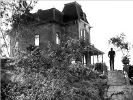Eye For Film >> Movies >> Psycho (1960) Film Review
Psycho
Reviewed by: Jennie Kermode

"The real secret of Psycho is that it's a tragedy first and a horror movie second," said Anthony Perkins of Hitchcock's difficult but iconic film. Though it still delivers shocks and scares to audiences today, it is most memorable because of its exploration of character.
Hitchcock came to Psycho fairly late in his career, at a stage when he was continually looking for challenges. In this case he asked himself if he could still make a film work if he killed off its heroine (Janet Leigh) within the first half hour. He also experimented with creating a heroine who is initially unsympathetic - she is on the run after stealing from her employer - which was a bold move at the time (highly influential since) and, paradoxically, allowed audiences to feel much closer to her when she found herself in danger. It shattered the old stereotype of the pure and fragile heroine once and for all. Because at first she seems to have the upper hand, her murder is all the more shocking.

Leigh's character is driving cross country and elects to spend the night at the wrong motel. This crumbling edifice, hauntingly shot in black and white, is as much a character in the film as any of the leads, not least as we look up at a high window and see the silhouette of a rocking chair moving back and forth. This is Mother's room and the centre of the world for shy, polite motel proprietor Norman Bates, who struggles with the conflict between his natural human desires and the knowledge of what his monstrous Mother would think of them. There's a lot of moralising here about masculinity and the damaging potential of any close maternal influence over a boy, but Perkins' nuanced performance gives his troubled character far greater depth.
In modern terms, the psychoanalysis we are treated to at the end of this film may seem crude and offensive, but in its time it represented a genuine attempt at sympathy and understanding, and it was a daring element to introduce to a film with such a dark storyline, blurring Hollywood's comfortable distinctions between good and evil. The presence of strong female characters who feel concern for Bates balances out the demonisation of the feminine. The treatment of transvestism is still very much of its time, and an enlightened modern audience should know better, but in a way this only adds to the film's poignancy, especially as Perkins himself was an advocate of psychoanalysis and had undergone therapy to try and cure his attraction to men.
Psycho suffers in its middle section when the charismatic Leigh is gone and we are left to watch less forceful characters muddle their way through the mystery surrounding the motel, but even here Hitchcock's mastery of suspense shines through. Though he always wished he could have made the film in colour, he makes superb use of light and shadow and the eventual effect is much creepier in black and white. No amount of experience watching modern slasher films will inure you to the fear that Hitchcock could instill with his masterly pacing and restraint. The horror is real, and it serves in turn to make the plight of the characters all the more tragic. If you haven't seen this yet, you should consider it a vital part of your film education. If you have, it's well worth repeat viewings.
Reviewed on: 15 Jun 2009


















